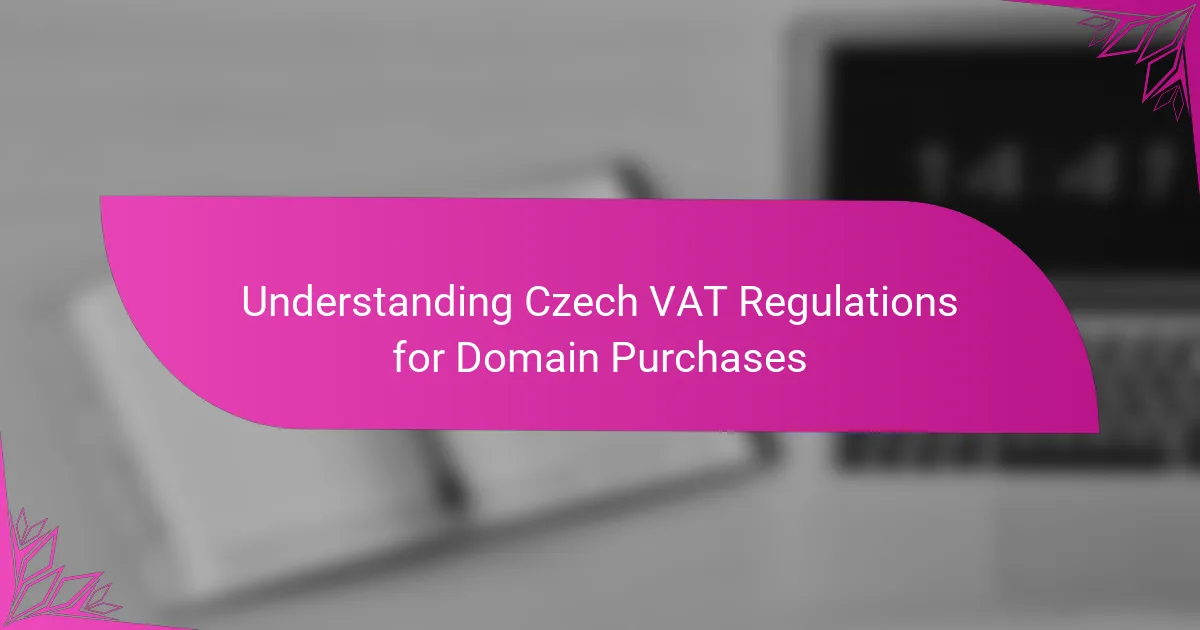Understanding Czech VAT regulations is crucial for anyone involved in domain purchases, as these transactions are subject to Value Added Tax. Businesses and individuals must be aware of their VAT obligations, including registration and reporting requirements, to ensure compliance and avoid penalties.
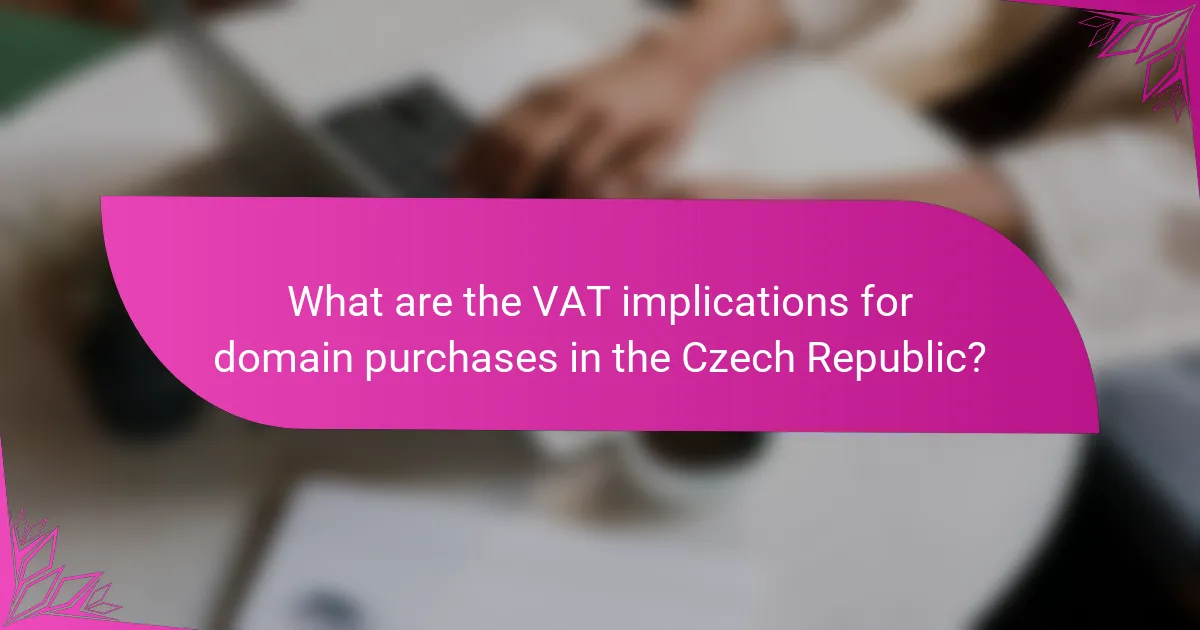
What are the VAT implications for domain purchases in the Czech Republic?
In the Czech Republic, domain purchases are subject to Value Added Tax (VAT) regulations. Businesses and individuals must understand their VAT obligations to ensure compliance and avoid potential penalties.
VAT registration requirements
If you are purchasing a domain as a business in the Czech Republic, you may need to register for VAT if your taxable turnover exceeds a certain threshold, typically around CZK 1 million annually. Non-residents purchasing domains may also need to register if they are providing taxable services in the country.
It is advisable to consult with a tax professional to determine your specific registration requirements based on your business activities and turnover.
Applicable VAT rates
The standard VAT rate in the Czech Republic is 21%. This rate applies to most goods and services, including domain purchases. However, there are reduced rates of 15% and 10% for specific categories, but these do not typically apply to domain registrations.
When purchasing a domain, ensure that the VAT is included in the total price quoted by the registrar, as this affects your overall cost.
Exemptions for non-residents
Non-residents may be exempt from VAT on domain purchases if they do not have a permanent establishment in the Czech Republic. This means that if you are a foreign entity without a physical presence in the country, you might not be liable for VAT on your domain purchase.
However, it is essential to verify the specific conditions and documentation required to claim this exemption, as regulations can vary based on individual circumstances. Consulting with a local tax advisor can provide clarity on your obligations and potential exemptions.
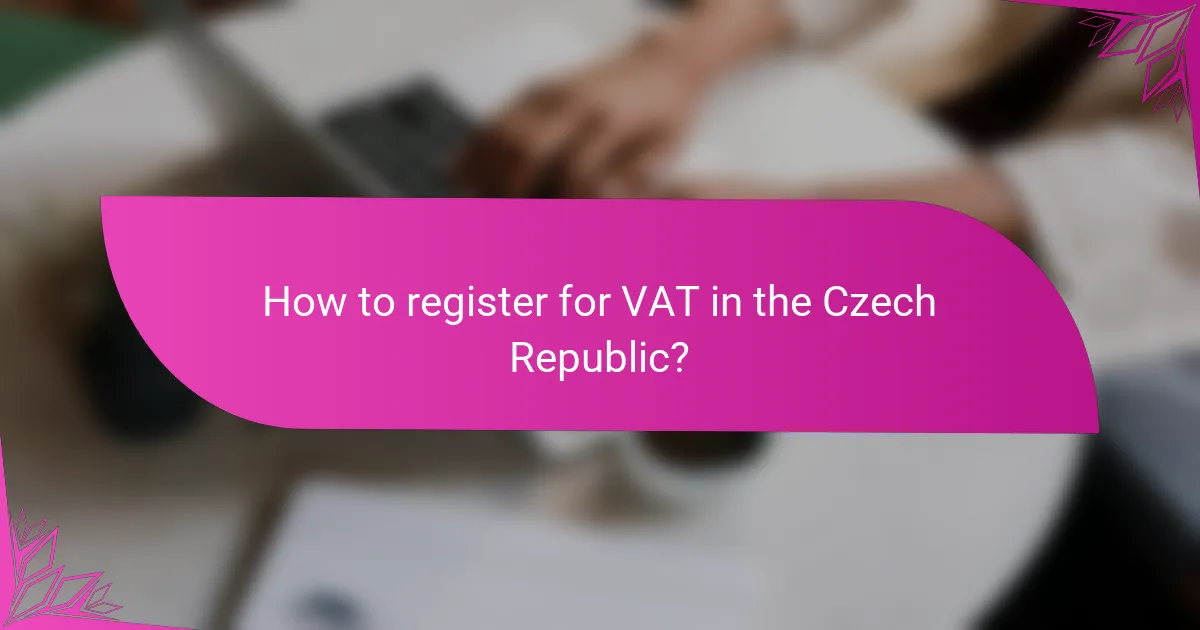
How to register for VAT in the Czech Republic?
To register for VAT in the Czech Republic, businesses must submit an application to the tax authority. This process is essential for companies whose taxable turnover exceeds a certain threshold, allowing them to charge VAT on sales and reclaim VAT on purchases.
Steps for VAT registration
The first step in VAT registration is to determine if your business meets the turnover threshold, which is generally around CZK 1 million for goods and services. If you exceed this amount, you must complete the VAT registration form, known as the “Přihláška k registraci k DPH.” This form can be submitted online or in person at the local tax office.
After submitting the application, the tax authority typically processes it within 30 days. If approved, you will receive a VAT identification number, allowing you to start charging VAT on your sales. Make sure to keep accurate records of your transactions, as these will be necessary for your VAT returns.
Required documentation
When registering for VAT in the Czech Republic, you will need to provide several key documents. These typically include proof of business registration, identification documents of the business owner, and financial statements that demonstrate your turnover.
Additionally, if your business is a foreign entity, you may need to submit a certificate of tax residence from your home country. It’s advisable to check with the local tax office for any specific requirements or additional documents that may be necessary for your situation.
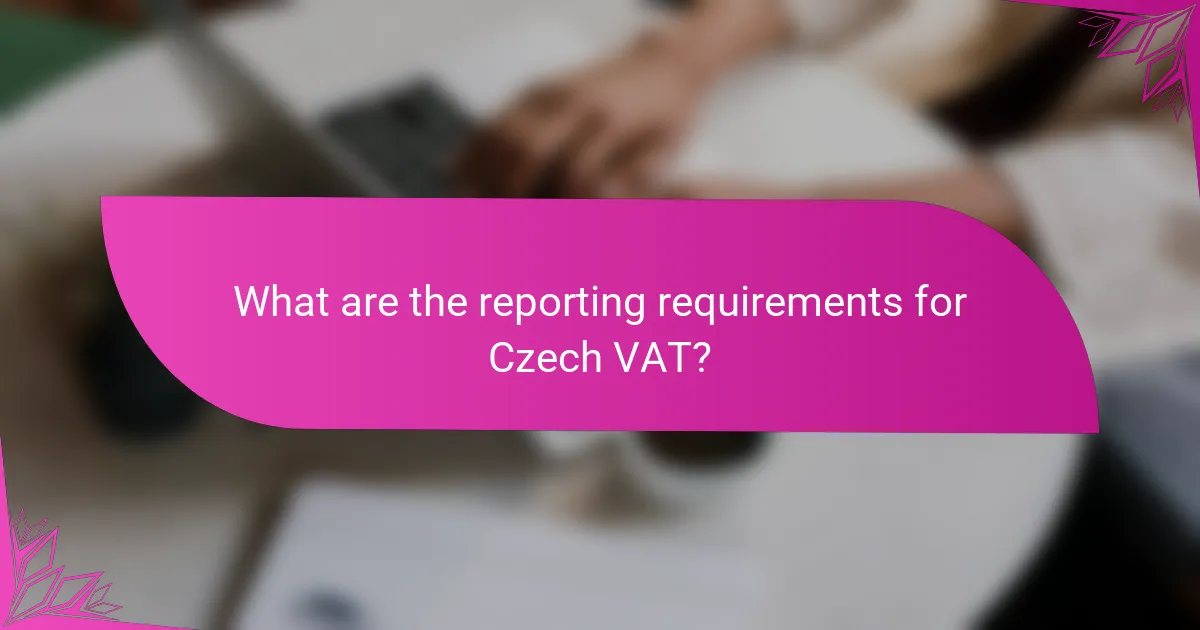
What are the reporting requirements for Czech VAT?
Czech VAT reporting requirements involve submitting periodic VAT returns to the tax authorities, detailing both sales and purchases subject to VAT. Businesses must ensure compliance with these regulations to avoid penalties and ensure accurate tax reporting.
Frequency of VAT returns
In the Czech Republic, VAT returns are typically filed on a monthly basis for businesses with an annual turnover exceeding a certain threshold. For smaller businesses, the frequency may be reduced to quarterly submissions. It’s crucial to keep track of your turnover to determine the correct filing frequency.
Monthly returns are due by the 25th day of the month following the reporting period, while quarterly returns are due by the same date after the end of the quarter. Late submissions can result in fines, so timely filing is essential.
Information to include in VAT reports
VAT reports must include detailed information about taxable sales and purchases, including the total amount of VAT charged and paid. Businesses should provide accurate figures for both domestic and international transactions, as well as any exemptions or zero-rated sales.
Key information to include in your VAT return consists of your business identification details, the reporting period, and a breakdown of VAT amounts. Ensure that all invoices are properly documented and retained, as they may be required for audit purposes.

How does VAT affect pricing for domain purchases?
VAT significantly impacts the pricing of domain purchases in the Czech Republic, as it is added to the base price of the domain. This tax can increase the overall cost by a notable percentage, affecting budget considerations for buyers.
Impact on final purchase price
The final purchase price of a domain in the Czech Republic includes the base price plus VAT, which is typically around 21%. For example, if a domain costs CZK 1,000, the total price after VAT would be approximately CZK 1,210. Buyers should factor this tax into their budgets to avoid unexpected expenses.
Additionally, some domain registrars may include VAT in their advertised prices, while others may list prices before tax. Always check whether the price you see is inclusive or exclusive of VAT to ensure accurate budgeting.
Comparative pricing with other EU countries
When comparing domain prices across EU countries, VAT rates can vary significantly. For instance, countries like Germany and France have VAT rates around 19% and 20%, respectively, which can lead to different final prices for the same domain. Understanding these differences can help buyers make informed decisions.
Buyers should also consider the overall market conditions and pricing strategies of registrars in different countries. Some may offer lower base prices but higher VAT, while others might have higher base prices with lower VAT. Always evaluate the total cost, including VAT, when comparing options across borders.
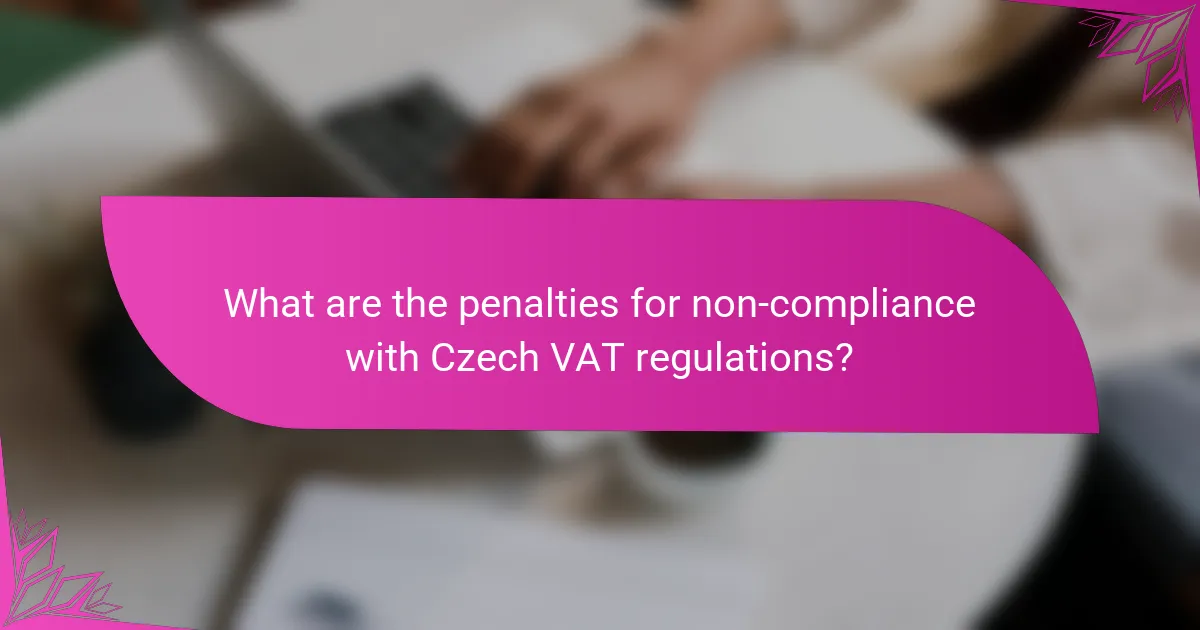
What are the penalties for non-compliance with Czech VAT regulations?
Penalties for non-compliance with Czech VAT regulations can include fines, interest on unpaid taxes, and potential legal action. Businesses must adhere to filing deadlines and accurate reporting to avoid these consequences.
Common penalties for late filing
Late filing of VAT returns in the Czech Republic typically incurs a fine that can range from CZK 1,000 to CZK 50,000, depending on the duration of the delay. Additionally, interest may be charged on any outstanding VAT owed, calculated daily from the due date until payment is made.
To mitigate these penalties, businesses should establish a reliable filing schedule and consider using accounting software that sends reminders for upcoming deadlines. Regularly reviewing VAT obligations can help prevent late submissions.
Consequences of incorrect VAT reporting
Incorrect VAT reporting can lead to significant penalties, including fines that may reach up to 10% of the VAT amount incorrectly reported. If the error is deemed intentional, penalties can be much higher, and the business may face legal repercussions.
To avoid these issues, businesses should ensure that all transactions are accurately recorded and double-checked before submission. Consulting with a tax advisor familiar with Czech VAT regulations can provide additional assurance of compliance and accuracy.

What resources are available for understanding Czech VAT regulations?
To understand Czech VAT regulations for domain purchases, various resources can provide essential guidance. Official government websites and specialized consulting firms are key sources for accurate and up-to-date information.
Official government resources
The Czech Ministry of Finance provides comprehensive information on VAT regulations, including guidelines specific to digital services and domain purchases. Their website offers downloadable documents, FAQs, and contact information for further inquiries.
Additionally, the Czech Tax Administration’s portal includes practical tools such as VAT calculators and detailed explanations of applicable rates. Regular updates ensure that users have access to the latest regulatory changes.
Consulting firms specializing in VAT
Consulting firms that focus on VAT can offer tailored advice and insights into the complexities of Czech VAT regulations. These firms typically provide services such as VAT registration assistance, compliance checks, and strategic planning for domain purchases.
Engaging a consulting firm can be particularly beneficial for businesses unfamiliar with local tax laws. They can help navigate potential pitfalls, such as incorrect VAT filings, which may lead to penalties or additional taxes.

What are the future trends in VAT regulations for digital services in the EU?
Future trends in VAT regulations for digital services in the EU are likely to focus on increased compliance and transparency, as well as the expansion of the digital services tax framework. The European Commission aims to simplify VAT rules and ensure that digital services are taxed fairly across member states.
Increased Compliance Requirements
As digital services continue to grow, EU regulations are expected to introduce stricter compliance measures for businesses. Companies may need to implement more robust reporting systems to track VAT on cross-border transactions effectively. This could involve additional administrative burdens, particularly for small businesses.
For example, businesses might have to register for VAT in multiple EU countries if they exceed certain sales thresholds. Understanding these thresholds is crucial for maintaining compliance and avoiding penalties.
Expansion of the Digital Services Tax Framework
The EU is exploring the expansion of the digital services tax framework to ensure that tech giants contribute fairly to the economies in which they operate. This could lead to new tax obligations for companies providing digital services, such as online advertising and streaming services.
Businesses should prepare for potential changes by staying informed about proposed regulations and assessing their current tax strategies. Engaging with tax professionals can help navigate these evolving requirements.
Focus on Transparency and Fair Taxation
Future VAT regulations are likely to emphasize transparency and fair taxation, ensuring that all digital services are taxed appropriately. This may involve increased scrutiny of pricing models and revenue reporting by digital service providers.
Companies should consider adopting transparent pricing strategies that clearly outline VAT charges to customers. This not only aids compliance but also builds trust with consumers who are increasingly aware of tax implications in digital transactions.
